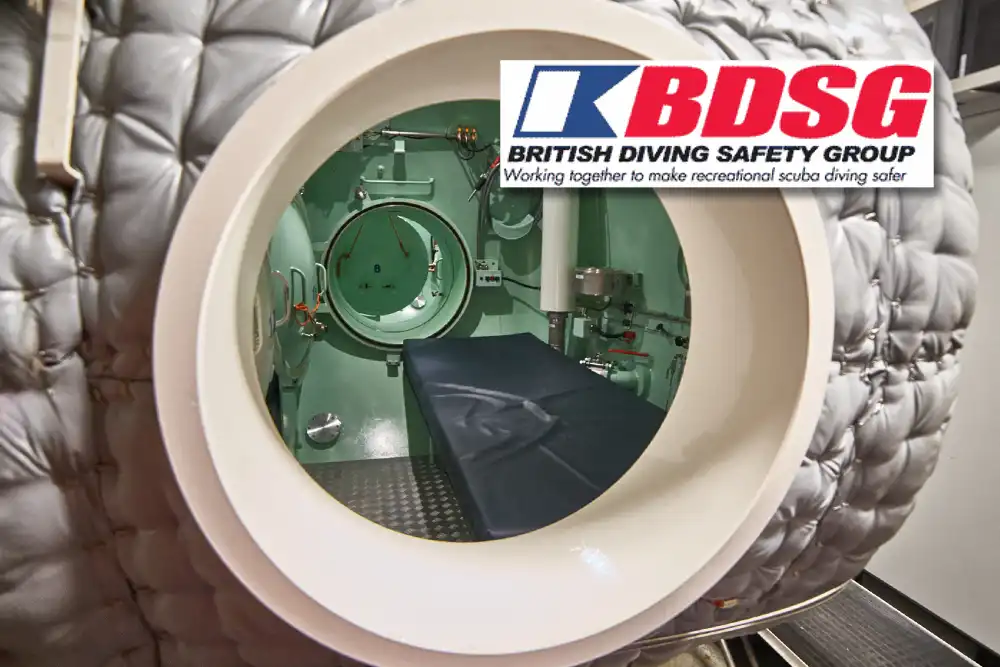
The number of Category 1 hyperbaric chambers available to scuba divers in England is to be cut from eight to just three, and all of them will be on the south coast of England.
The news is a serious blow to UK diver safety, following just a few months after the closure of The Diver Clinic, Diving & Hyperbaric Medicine Unit based in Poole, Dorset, in January this year.
In a statement by the British Divers Safety Group (BDSG), it has been confirmed that NHS England has awarded contracts for Hyperbaric Oxygen Therapy (HBOT) services to just three of six planned regional centres.
Contracts have been awarded to the East of England (Great Yarmouth), London and South East (Chichester) and the South West (Plymouth) following a public consultation which initially proposed reducing the number of chambers from eight to six.
The BDSG says that at this time, no contracts have been awarded for the North East, North West, or Midlands regions, a decision which affects four existing hyperbaric chambers – LHM Healthcare (Whipps Cross), Midlands Diving Chamber (Rugby), North England Medical Hyperbaric (Hull) and Hyperbaric Treatment and Training Services (Wirral).
The four chambers will lose their NHS contracts as of 1 October 2025, meaning that unless alternative arrangements can be made, they will almost certainly be forced to close.
‘This decision will leave divers across the Midlands and Northern England without timely NHS-funded access to vital recompression facilities — a critical component of emergency treatment for decompression illness,’ said a BDSG spokesperson.

‘This isn’t just about geography – it is about fairness, safety and survival,’ the spokesperson added. ‘Diving emergencies cannot wait and removing access will not save money in the long term.
‘It simply shifts the cost to lives lost, prolongation of treatment and illness. It will also unnecessarily tie up blue light emergency services.’
The distance between some of England’s most popular dive sites – such as the Farne Islands, off England’s north eastern coast – and the southern chambers means that divers suffering from serious decompression injuries could, in theory, face a 400 mile journey to the south coast, thereby delaying potentially life-saving treatment.
‘This is an extremely concerning decision for UK diving,’ said Matt King, director of Stoney Cove, a popular inland quarry based in Leicester, in central England.
‘Reducing operating hyperbaric chambers by over 60 per cent and confining coverage to only the east and south of the country places divers who find themselves in difficulty across the midlands and north at significantly larger risk to their health, forcing them to travel far further and longer for appropriate medical attention and placing an unnecessary amount of strain on an already stretched ambulance service.’
Serious decompression illnesses can be brought on even from shallow dives, and can be fatal unless treated rapidly.
Lung overexpansion injuries resulting in arterial gas embolism (AGE), in which breathing gas is forced into the bloodstream, for example, can occur during a breath-holding ascent from as little as 2m.
‘Diving warrants immediate and specialised treatment in the event of decompression illness,’ continued the BDSG spokesperson. ‘The absence of contracted chambers in central and northern regions of England exposes divers to increased health risks and undermines national diving safety protocols.’
The BDSG says the decision to shutter the northern chambers highlights a growing inequity in NHS service provision and has been met with alarm by diving safety advocates, emergency responders, and the wider diving community, adding that the UK’s extensive coastline and inland dive sites means that ensuring timely nationwide access to recompression services is vital to safe diving practices and emergency preparedness.
Stakeholders in the UK dive industry – including training agency representatives and members of the RNLI – are urging NHS England to reconsider the move and engage with diving and medical communities to develop a more equitable model of care.
A petition will be launched in the next few days (it is not available at the time of publication of this article), and BDSG is also asking divers to consider writing to their MPs to voice their concerns.
The post NHS England to close four more hyperbaric chambers appeared first on DIVE Magazine.





